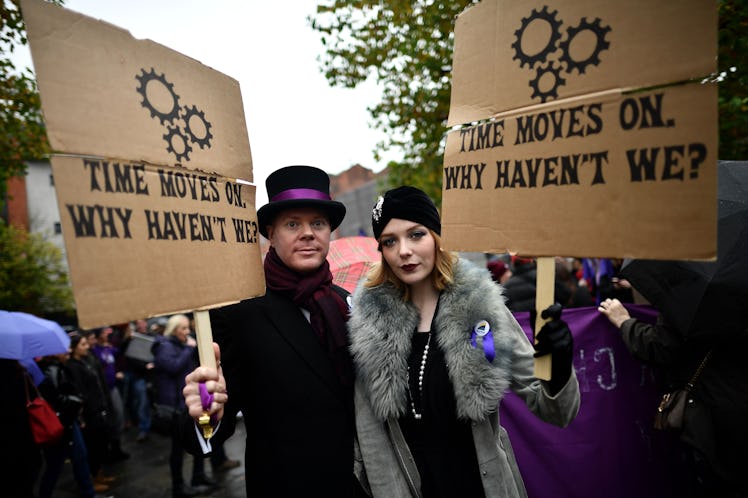
Ireland Is Voting To Get Rid Of Their Ban On Abortion (Yes, In 2018)
On Friday, May 25, the people of Ireland are having a referendum on abortion. What that means in plain language is that the Irish people are voting on whether or not abortion should be allowed in the nation. This is because, yes, in 2018, Ireland still has a nationwide ban on the medical procedure.
The Friday referendum will technically be about whether or not to repeal Ireland's Eighth Amendment, which was voted into law by its own referendum in 1983. The amendment says that both women and fetuses have an "equal right to life," and, according to TIME, 67 percent of people voted in favor of adding the amendment to their constitution. Abortion in general had been against the law in Ireland since 1861, and that amendment essentially prevented any attempt to change that. That referendum came about 15 years after the United Kingdom legalized abortion up to 28 weeks and 10 years after the United States Supreme Court recognized abortion as a constitutionally protected right in Roe v. Wade.
As it stands now, abortion is still illegal in Ireland, a Catholic country. The only exception to that was put in place in 2013, a year after Savita Halappanavar died in a hospital in Galway, Ireland after being refused an abortion while she was having a miscarriage. Since 2013, Irish women can legally get an abortion only if their lives are at risk. There are no exceptions for rape or incest. Getting an abortion against the law has a maximum penalty of 14 years in jail, according to the BBC.
Should the majority vote "yes" to repeal the Eighth Amendment, the government would introduce a bill with several stipulations about the legality of abortion. According to the Irish Times, the bill would allow abortion up to 12 weeks of a pregnancy (for context, an American court would easily find that an unconstitutionally short gestational period). The bill would not create an exception for abortions after 12 weeks in cases of rape or incest.
It would also institute a 72-hour waiting period, so women would have to go to a doctor to "certify" an abortion, and then she would have to wait three days before she actually gets the procedure (the constitutionality of waiting periods are regularly debated in American courts, but many states have them on the books). Finally, the bill would also allow for abortions when there is a threat to the woman's life or a fatal fetal abnormality (i.e. a diagnosis that the fetus would not survive outside of the womb).
The thing about abortion is that just because you ban it doesn't mean that women will stop needing it. Life happens. Rape happens. Devastating fetal diagnoses happen. Sperm and eggs don't always know what's on the Constitution. Without legal access to abortion where a woman lives, history has shown, women will travel to where it is legal or they will take desperate, possibly unsafe measures (when done by a trained medical provider in a clean medical facility, on the other hand, the procedure is very safe).
So because of the ban, an average of nine women travel from Ireland to the U.K. to get an abortion every day, according to 2016 statistics from the Chief Medical Officers of England and Wales. This amounts to some 3,000 women every year. Meanwhile, per Ireland's Minister for Health, about three women a day take abortion pills in Ireland, defying the law (again, medication abortion is very safe, provided that the pills are legitimate, which is better ensured when they are prescribed at a pharmacy or doctor's office).
The referendum is getting international attention on many levels. First, many Irish people from across the globe are traveling home to Ireland to vote — and marking their travels on Twitter with the #HomeToVote (#RepealThe8th is being used by social media users in support of taking down the ban).
Meanwhile, people around the world are watching the vote as it relates to how tech companies are addressing political ads, especially in light of the U.S. presidential election and other elections that have been impacted by both foreign advertisers and by advertisers potentially misusing user data. Both Facebook and Google have set rules about blocking ads on abortion in Ireland, although, much like the real-world efficacy of an abortion ban, the real-world efficacy of those rules is being questioned.
An Irish Times/Ipsos MRBI survey published on May 17 showed that the vote was very close, with "yes" (to repeal the ban) just slightly ahead. In their poll, 44 percent said they'd vote to repeal, 32 percent said they'd vote to not repeal, and 17 percent are undecided. The polls close on Friday at 10 p.m. local time, according to The Irish Times, which is 5 p.m. ET. Then, the country will see if there will be a landmark change to women's rights.